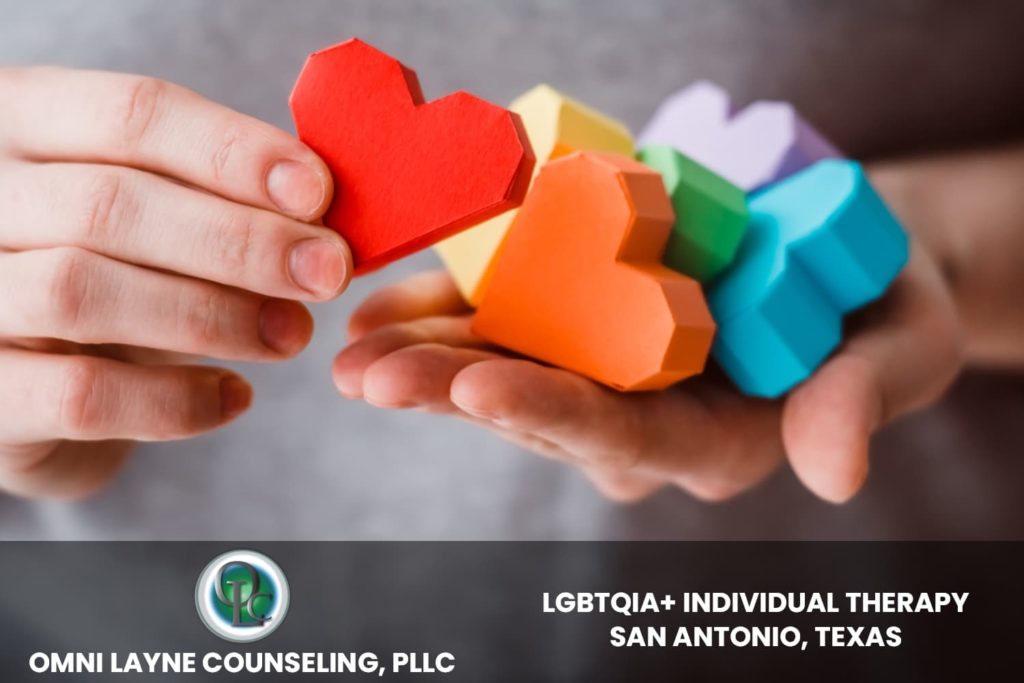LGBTQIA+ Individual Therapy
with Omni Layne Counseling, PLLC
3740 Colony Dr #122, San Antonio, TX 78230, United States
Located in Colonies North Professional BLD

The acronym LGBTQIA, an expansion of the previously used LGBT, was expanded to include a larger number of people. Some believe that classifying persons who are not heterosexual or cisgender (or neither) under this acronym, which may or may not correctly represent their specific sexual orientation or identity, is a discriminatory act in and of itself. Alternative terms such as GSM (gender and sexual minorities) or LGBTQ+ are being explored by others who believe that they better represent the wide range of identities and orientations that people can hold.
Lesbian, gay, bisexual, transgender, queer and questioning, intersex, and asexual people are represented by the current acronym.
Despite the acronym’s name, the “Q” stands for queer as well as questioning While some people use the umbrella term “queer” in place of LGBTQIA, not everyone identifies as queer or prefers to use this term.
While some believe the “A” stands for both “ally” and “asexual,” there is significant debate concerning the inclusion of allies in the acronym, as “ally” is neither a gender identity or sexual orientation.
Notwithstanding exponentially growing public acceptance of varied sexual and romantic orientations and gender identities, LGBTQ persons continue to face oppression, discrimination, and marginalization. Learning to cope with discrimination and oppression, coming out to one’s family, and establishing a “authentic” sense of self in the face of social expectations and demands can all lead to greater levels of depression, anxiety, substance use, and other mental health issues for LGBTQ persons.
According to research, LGBTQ kids are at a higher risk of suicidal ideation and self-harm, especially if they face discrimination based on their sexual or gender identity. According to a 2007 survey, students who identified as lesbian, gay, bisexual, or transgender were nearly ten times more likely than their heterosexual, non-transgender classmates to have experienced bullying and victimization at school and more than twice as likely to have considered suicide in the previous year.
Discrimination can manifest itself in a variety of ways, including social rejection, verbal and physical bullying, and sexual assault, and repeated incidents are likely to result in chronic stress and poor mental health. Perceived discrimination—the expectation of discrimination—can also have a negative impact on mental health. LGBTQ individuals may face comparable forms of harassment as well as discrimination in housing, work, education, and basic human rights.
Many of the problems and life challenges that LGBTQ persons bring to therapy are shared by everyone. Every couple fights over many of the same issues—money, sex, in-laws, quality time—and everyone faces the same kinds of daily stressors, such as mood swings, workplace difficulties, or low self-esteem.
Though many therapists are equipped to assist, LGBTQ clients may feel more at ease with an LGBTQ therapist, or at the very least with a therapist who specializes in or has extensive expertise with LGBTQ issues. Such therapists are not available in every location, but an increasing number of therapists and counselors are offering distance services via phone or the Internet, which may help a person’s search for the suitable therapist.
People considering gender confirmation surgery are frequently asked to seek counseling before proceeding with the procedure. If one is available, a specialist in this field is advised.
Until clinical research proved that sexual or romantic attraction to someone of the same gender is a normal, healthy, and positive form of human sexuality, early editions of the Diagnostic and Statistical Manual (DSM) classified homosexuality as a mental disease.
Despite the mental health community’s decades-long support of all sexual orientations, some therapists continue provide sexual orientation change attempts (SOCE) and some people who are ambivalent about their sexual orientation explore SOCE.
Several organizations, including the American Psychological Association and the American Psychiatric Association, are opposed to sexual orientation change therapy, also known as conversion or reparative therapy, and many states have either banned or are considering legislation to prohibit it, particularly for minors. Furthermore, the ethics of the professions of social work, psychology, psychiatry, and marital and family counseling require therapists to give services without discrimination to all persons.
The DSM-5 includes gender dysphoria as a psychiatric illness to account for the severe discomfort that a person may experience when their gender identity or expression does not coincide with the gender assigned at birth.
The disease was previously described as gender identity disorder, but after receiving complaints about the stigmatizing effect of the word “disorder,” it was renamed gender dysphoria to guarantee that gender nonconformity was not labeled as a mental disorder.
Gender dysphoria diagnosis necessitates:
A significant conflict between their gender identity or expression and the gender assigned to them at birth that lasts at least six months. As a result of the disorder, there is measurable impairment or suffering in routine functions such as social or professional.
To be diagnosed with gender dysphoria, a child must meet six of eight criteria, including the child’s assertion that they are not the gender assigned at birth, a strong hatred of their own sexual anatomy, and a strong desire for clothes, toys, and activities associated with another gender.
Gender dysphoria in adolescents and adults is diagnosed when an individual meets at least two of six criteria, which include a conflict between the gender assigned at birth and the gender experienced, a desire to have different anatomical characteristics/characteristics of a gender other than the gender assigned at birth, and the experience of feelings and reactions typically associated with a gender other than the gender assigned at birth.
What is the next step?
If you or someone you love is considering individual therapy or counseling, please contact Omni Layne Counseling. We are a team of professionals who have expertise to help.
Call us at our office to schedule an appointment with one of our highly skilled clinicians at Omni Layne Counseling, PLLC.
